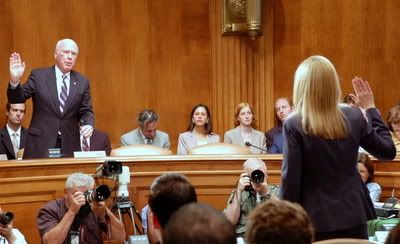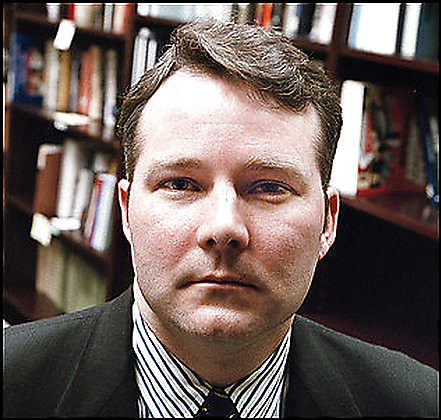As senators are only now learning, the Bush administration slipped legislation into the bill to reauthorize the Patriot Act that lets Bush appoint U.S. attorneys without having to have them confirmed by the Senate. Senators would have discovered this before they voted on the reauthorization last year
had they been doing their jobs and read the damned thing!How many other time bombs have Republicans planted in six years of legislation, with the Democrats asleep at the wheel?
How many times do Democrats have to be told, "Yes, Republicans really, really are not your friends, they have to be watched every minute, and it's YOUR job to do it!"?
Did you catch Barney Frank on Bill Maher?
Barney Frank didn't vote yes on going to war with Iraq or on any bills to fund it. He knew that this was a lying administration and he didn't believe anything coming out of it. He doesn't have any sympathy for his colleagues in Congress who say they were taken in by the Bush administration; if he knew what Bush-Cheney were about, and the Democratic party's base knew what Bush-Cheney were about, why didn't they?
It's a great question. An even better question is, "What keeps Democrats in Congress from doing the right thing
now?"
In Bob Woodward's book, "State of Denial," all of the classified intelligence that was available to Bush was made available to all members of Congress. All they had to do was go to a guarded room at the Capitol to see the files. Very few did.
I've been trying to find out for months who did and who didn't, with no success.
The old days of collegial fraternity in Congress are over. Forever. This is not an anomaly. These are not just the usual political dirty tricks, Donald Seghretti-style rat-fucking, "all's fair" kind of tactics.
Out of Watergate came a group of very angry and cunning young men who were willing to go beyond the line of ethical limits. And they were also willing to wait, to spend a couple of decades, if need be, preparing for a revolution that would keep them in power for generations. Once a Lee Atwater arrives in politics, there are a dozen others who will (and did) study at his knee, and build upon what they learned. If Karl Rove were to disappear tomorrow, his spawn would just pick up where he left off. As a matter of fact, a Rove aide (Tim Griffin) was given the job of one of the fired U.S. attorneys.
That is the problem with memes: Once they are launched, they're out of your control and you can never tell how they will permutate a system.
Unfortunately, the Democrats in office today just don't understand that. They stand around looking stupefied as Bush-Cheney ignore them. If it's not Bush's signing statements, it's the Democrats rendering themselves irrelevant (Pelosi assuring Bush that there will be no impeachment inquiry, a non-binding resolution on the war in Iraq).
I can envision Bush-Cheney, after the vote on the reauthorization of the Patriot Act, laughing themselves silly over the fact that the Democrats rendered themselves irrelevant by voting yes. "We can replace any U.S. attorney and they can't stop it. All we had to do was challenge their patriotism in the media to bully them into voting yes. They're scared to death to vote no - we could slip in an authorization to attack Iran, N. Korea, France, and they wouldn't even know it because they don't read the bills! There's no law that requires us to disclose what's in the bill: Caveat emptor!" Talk about your dilletantes.
We've got bigger troubles than Bush-Cheney and Republicans - We've got a lot of dead wood in office, Democrats, who need clearing out.
As Democratic Senators make noise about rescinding only that portion of the Patriot Act which allows the Executive branch to replace U.S. attorneys without Senate confirmation, the
NYT reminds us of what else the Democratically-controlled Congress needs to rescind:
The Bush administration’s assault on some of the founding principles of American democracy marches onward despite the Democratic victory in the 2006 elections. The new Democratic majorities in Congress can block the sort of noxious measures that the Republican majority rubber-stamped. But preventing new assaults on civil liberties is not nearly enough.
Five years of presidential overreaching and Congressional collaboration continue to exact a high toll in human lives, America’s global reputation and the architecture of democracy. Brutality toward prisoners, and the denial of their human rights, have been institutionalized; unlawful spying on Americans continues; and the courts are being closed to legal challenges of these practices.
It will require forceful steps by this Congress to undo the damage. A few lawmakers are offering bills intended to do just that, but they are only a start. Taking on this task is a moral imperative that will show the world the United States can be tough on terrorism without sacrificing its humanity and the rule of law.
Today we’re offering a list — which, sadly, is hardly exhaustive — of things that need to be done to reverse the unwise and lawless policies of President Bush and Vice President Dick Cheney. Many will require a rewrite of the Military Commissions Act of 2006, an atrocious measure pushed through Congress with the help of three Republican senators, Arlen Specter, Lindsey Graham and John McCain; Senator McCain lent his moral authority to improving one part of the bill and thus obscured its many other problems.
Our list starts with three fundamental tasks:
Restore Habeas Corpus
One of the new act’s most indecent provisions denies anyone Mr. Bush labels an “illegal enemy combatant” the ancient right to challenge his imprisonment in court. The arguments for doing this were specious. Habeas corpus is nothing remotely like a get-out-of-jail-free card for terrorists, as supporters would have you believe. It is a way to sort out those justly detained from those unjustly detained. It will not “clog the courts,” as Senator Graham claims. Senator Patrick Leahy of Vermont, the Democratic chairman of the Judiciary Committee, has a worthy bill that would restore habeas corpus. It is essential to bringing integrity to the detention system and reviving the United States’ credibility.
Stop Illegal Spying
Mr. Bush’s program of intercepting Americans’ international calls and e-mail messages without a warrant has not ceased. The agreement announced recently — under which a secret court supposedly gave its blessing to the program — did nothing to restore judicial process or ensure that Americans’ rights are preserved. Congress needs to pass a measure, like one proposed by Senator Dianne Feinstein, to force Mr. Bush to obey the law that requires warrants for electronic surveillance.
Ban Torture, Really
The provisions in the Military Commissions Act that Senator McCain trumpeted as a ban on torture are hardly that. It is still largely up to the president to decide what constitutes torture and abuse for the purpose of prosecuting anyone who breaks the rules. This amounts to rewriting the Geneva Conventions and puts every American soldier at far greater risk if captured. It allows the president to decide in secret what kinds of treatment he will permit at the Central Intelligence Agency’s prisons. The law absolves American intelligence agents and their bosses of any acts of torture and abuse they have already committed.
Many of the tasks facing Congress involve the way the United States takes prisoners, and how it treats them. There are two sets of prisons in the war on terror. The military runs one set in Iraq, Afghanistan and Guantánamo Bay. The other is even more shadowy, run by the C.I.A. at secret places.
Close the C.I.A. Prisons
When the Military Commissions Act passed, Mr. Bush triumphantly announced that he now had the power to keep the secret prisons open. He cast this as a great victory for national security. It was a defeat for America’s image around the world. The prisons should be closed.
Account for ‘Ghost Prisoners’
The United States has to come clean on all of the “ghost prisoners” it has in the secret camps. Holding prisoners without any accounting violates human rights norms. Human Rights Watch says it has identified nearly 40 men and women who have disappeared into secret American-run prisons.
Ban Extraordinary Rendition
This is the odious practice of abducting foreign citizens and secretly flying them to countries where everyone knows they will be tortured. It is already illegal to send a prisoner to a country if there is reason to believe he will be tortured. The administration’s claim that it got “diplomatic assurances” that prisoners would not be abused is laughable.
A bill by Representative Edward Markey, Democrat of Massachusetts, would require the executive branch to list countries known to abuse and torture prisoners. No prisoner could be sent to any of them unless the secretary of state certified that the country’s government no longer abused its prisoners or offered a way to verify that a prisoner will not be mistreated. It says “diplomatic assurances” are not sufficient.
Congress needs to completely overhaul the military prisons for terrorist suspects, starting with the way prisoners are classified. Shortly after 9/11, Mr. Bush declared all members of Al Qaeda and the Taliban to be “illegal enemy combatants” not entitled to the protections of the Geneva Conventions or American justice. Over time, the designation was applied to anyone the administration chose, including some United States citizens and the entire detainee population of Gitmo.
To address this mess, the government must:
Tighten the Definition of Combatant
“Illegal enemy combatant” is assigned a dangerously broad definition in the Military Commissions Act. It allows Mr. Bush — or for that matter anyone he chooses to designate to do the job — to apply this label to virtually any foreigner anywhere, including those living legally in the United States.
Screen Prisoners Fairly and Effectively
When the administration began taking prisoners in Afghanistan, it did not much bother to screen them. Hundreds of innocent men were sent to Gitmo, where far too many remain to this day. The vast majority will never even be brought before tribunals and still face indefinite detention without charges.
Under legal pressure, Mr. Bush created “combatant status review tribunals,” but they are a mockery of any civilized legal proceeding. They take place thousands of miles from the point of capture, and often years later. Evidence obtained by coercion and torture is permitted. The inmates do not get to challenge this evidence. They usually do not see it.
The Bush administration uses the hoary “fog of war” dodge to justify the failure to screen prisoners, saying it is not practical to do that on the battlefield. That’s nonsense. It did not happen in Afghanistan, and often in Iraq, because Mr. Bush decided just to ship the prisoners off to Gitmo.
Prisoners designated as illegal combatants are subject to trial rules out of the Red Queen’s playbook. The administration refuses to allow lawyers access to 14 terrorism suspects transferred in September from C.I.A. prisons to Guantánamo. It says that if they had a lawyer, they might say that they were tortured or abused at the C.I.A. prisons, and anything that happened at those prisons is secret.
At first, Mr. Bush provided no system of trial at the Guantánamo camp. Then he invented his own military tribunals, which were rightly overturned by the Supreme Court. Congress then passed the Military Commissions Act, which did not fix the problem. Some tasks now for Congress:
Ban Tainted Evidence
The Military Commissions Act and the regulations drawn up by the Pentagon to put it into action, are far too permissive on evidence obtained through physical abuse or coercion. This evidence is unreliable. The method of obtaining it is an affront.
Ban Secret Evidence
Under the Pentagon’s new rules for military tribunals, judges are allowed to keep evidence secret from a prisoner’s lawyer if the government persuades the judge it is classified. The information that may be withheld can include interrogation methods, which would make it hard, if not impossible, to prove torture or abuse.
Better Define ‘Classified’ Evidence
The military commission rules define this sort of secret evidence as “any information or material that has been determined by the United States government pursuant to statute, executive order or regulation to require protection against unauthorized disclosure for reasons of national security.” This is too broad, even if a president can be trusted to exercise the power fairly and carefully. Mr. Bush has shown he cannot be trusted to do that.
Respect the Right to Counsel
Soon after 9/11, the Bush administration allowed the government to listen to conversations and intercept mail between some prisoners and their lawyers. This had the effect of suspending their right to effective legal representation. Since then, the administration has been unceasingly hostile to any lawyers who defend detainees. The right to legal counsel does not exist to coddle serial terrorists or snarl legal proceedings. It exists to protect innocent people from illegal imprisonment.
Beyond all these huge tasks, Congress should halt the federal government’s race to classify documents to avoid public scrutiny — 15.6 million in 2005, nearly double the 2001 number. It should also reverse the grievous harm this administration has done to the Freedom of Information Act by encouraging agencies to reject requests for documents whenever possible. Congress should curtail F.B.I. spying on nonviolent antiwar groups and revisit parts of the Patriot Act that allow this practice.
The United States should apologize to a Canadian citizen and a German citizen, both innocent, who were kidnapped and tortured by American agents.
Oh yes, and it is time to close the Guantánamo camp. It is a despicable symbol of the abuses committed by this administration (with Congress’s complicity) in the name of fighting terrorism.
,




